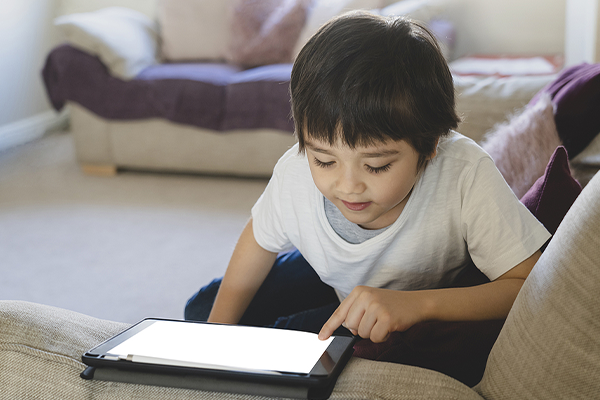Kids and the Blue Light Effect
The blue-hued glow coming from computers, smart phones, televisions and video games may seem harmless. However, this type of light can interfere with your child’s circadian rhythms and her ability to get good, quality sleep.
Understanding Blue Light
Visible light may be categorized according to colors, such as violet, red and blue. The blue light is what is typically emitted from screens that you and your family frequently use. This type of light, which is also present in sunlight, tricks the brain into thinking it is daytime even when it is not, keeping you in a constant state of wakefulness. In response, the body shuts down production of melatonin, a hormone that prepares the body for rest and helps inspire sleep. The release of this hormone naturally happens in the evening as it gets dark outside. But the blue light from screens delays that release.
How Your Kids Are Impacted
When exposed to blue light too close to bedtime, your child may not fall asleep as fast and end up getting an insufficient amount of rest. When this lack of sleep becomes an ongoing pattern, your child is at risk for a variety of challenges, including:
- Difficulty concentrating
- Irritability
- Obesity
- Type 2 diabetes
To help overcome the risk of lack of sleep due to blue light exposure, set a goal to power down electronics an hour or two before bedtime. Focus on relaxing activities instead, such as reading books. Help your child resist the urge to turn devices back on by making her bedroom an electronics-free zone. This may be a difficult goal for teens who are often glued to their smartphones. But not using technology before bed is especially important during this time of life, as teenagers seem to be more sensitive to blue light exposure.
Setting the Stage for Better Sleep
Turning off technology is one step your family can take to help improve everyone’s sleep. In addition to staying away from screens before bed, set goals to follow simple sleep hygiene best practices, including:
- Avoid eating big meals before bed.
- Exercise regularly during the day.
- Go to bed and wake up at the same time every day.
- Keep the bedroom dark and quiet.




